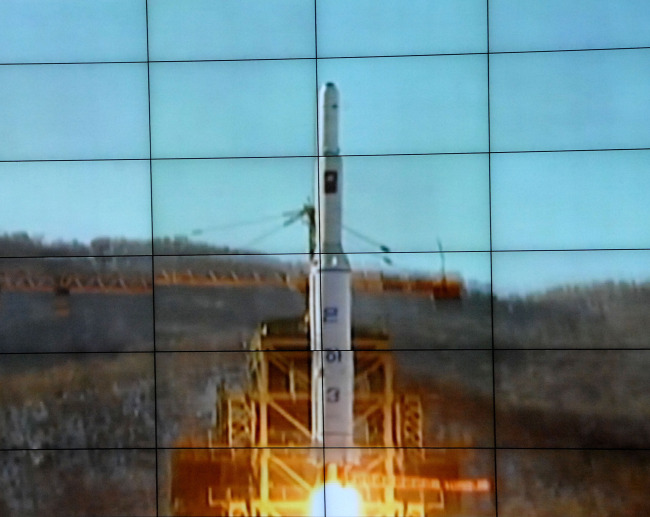South Korea is pushing for a sea transport embargo against North Korea as one of options to respond Pyongyang‘s long-range rocket launch, a senior presidential official said Thursday.
The official said Seoul will consult with other countries over the punitive action which he said would be have a significant impact on the North’s trade.
“We are considering sanctions in marine transport. Now that we have already set the legal grounds (over the restriction of the North’s sea transport), we will start talks with other countries over additional sanctions after watching the U.N. Security Council’s decision,” he told reporters, asking not to be named.
The U.N. Security Council on Wednesday condemned North Korea’s breach of bans on nuclear and missile activity. The council swiftly convened a meeting after the communist country successfully conducted what is believed to have been a covert test of a long-range ballistic missile.
“Members of the Security Council condemned this launch, which is a clear violation of Security Council resolutions 1718 and 1874,” said Mohammed Loulichki, Moroccan Ambassador to the U.N. and president of the 15-member council this month.
“Members of the Security Council will continue consultations on an appropriate response.”
The Seoul official expressed concern that China would be reluctant to push for stronger action as it has been in the past.
“If the council had taken tough enough action, it would’ve acted as a deterrent. Weak sanctions may lead North Korea to miscalculate that it would be ok to conduct a nuclear test.”
One possible ban will target shipments in and out of the North. A revision to the South’s Public Order in Open Ports Act mandates entry clearance for all container lines that have come into any North Korean port over the last 180 days, up from the previous 60 days.
China, the North’s principal ally, is a veto-wielding council member. Critics have pointed to its passive stance as a perennial obstacle to effective enforcement of past sanctions.
While acknowledging a violation of resolutions, Beijing defended its rogue neighbor’s fundamental right to make use of outer space and called for a cool-headed approach.
Any U.N. response “should be prudent, appropriate and conducive to peace and stability on the Korean peninsula and avoid the escalation of the situation,” foreign ministry spokesman Hong Lei told a briefing in Beijing.
“We hope relevant parties will keep calm and jointly maintain the peace and stability of the Korean peninsula.”
The council’s closed-door meeting came in reaction to the “trigger” clause installed in the Council’s statement following Pyongyang’s failed April launch. The stipulation forces an automatic gathering, making way for a quicker resolution and sanctions.
South Korea won a two-year non-permanent membership of the top decision-making body in October, which will take effect at the beginning of January. But U.N.-based Seoul diplomats were allowed to attend the session as observers.
Kim Sook, the country’s top representative to the U.N., said that a fresh resolution may need longer to come than three days it took last time but will surely contain a new bout of sanctions.
“South Korea and the U.S. are looking through details,” he told journalists. “There may be several options such as an expansion of existing sanctions targets or tightening of inspections (of cargoes shipped to and from the North).”
The council imposed sanctions against the North after its failed launches in 2006 and 2009. It added three North Korean state firms to the blacklist following the April attempt.
While leading consultations with other council members, Washington warned the wayward regime of punishment and deeper isolation.
“It is regrettable that the leadership in Pyongyang chose to take this course in flagrant violation of its international obligations,” White House spokesman Jay Carney said, adding that the regime will face “consequences” for its action.
State Department spokeswoman Victoria Nuland billed the launch “highly provocative and a threat to regional security.”
“It is only going to serve to further isolate the North Korean regime,” she told a briefing.
Despite projections that North Korean missiles may now be able to hit as far as California, Defense Secretary Leon Panetta said the U.S. has the capability to avert such a strike.
“I’m very confident that American defense capabilities are able, no problem, to block a rocket like this one,” Panetta said in an interview with CNN.
Seoul and Washington are also seen as striving to carry through its demands for tougher sanctions with the help of other countries including China and Russia.
On Wednesday, Lim Sung-nam, the South’s special representative for Korean Peninsula peace and security affairs responsible for six-party denuclearization talks, met in Seoul with Deputy Foreign Minister Igor Morgulov, Chinese Ambassador Zhang Xinsen and Japanese Ambassador Koro Bessho, respectively.
Foreign Minister Kim Sung-hwan had phone conversations on Tuesday with his counterparts in Japan, the U.K., France and Australia, during which they agreed on the need for harsher measures and greater bilateral cooperation, according to the ministry.
Vice Foreign Minister Ahn Ho-young also discussed the issue by phone with Wendy Sherman, the U.S. State Department’s under secretary for political affairs.
In Beijing, South Korean Ambassador Lee Kyu-hyung held one-hour talks later in the day with Wu Dawei, China’s top nuclear envoy for North Korea, to deliver Seoul’s position and rally support. Wu was known to have expressed regret but stressed peace and stability on the peninsula.
Wu was also believed to have met with Ji Jae-ryong, Pyongyang’s ambassador to Beijing, shortly before a meeting with Lee.
By Shin Hyon-hee (
heeshin@heraldcorp.com)








